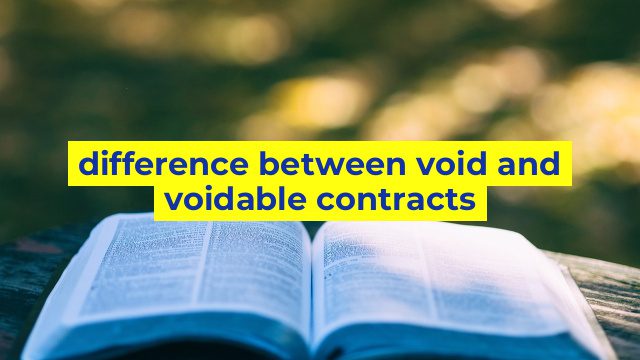The Difference Between Void and Voidable Contracts
When it comes to legal contracts, it is important to understand the differences between the terms “void” and “voidable”. While both terms refer to contracts that are not legally binding, there are distinct differences between them that have significant legal consequences.
What is a Void Contract?
A void contract is a contract that is invalid from its inception. This means that the contract was never legally valid and has no legal force or effect. There are several reasons why a contract might be considered void:
– The contract violates the law or public policy
– The contract lacks legal capacity (e.g. a contract signed by a minor)
– The contract is based on fraudulent or illegal activities
In any of these cases, a void contract cannot be enforced in court and the parties to the contract are not legally bound by its terms.
What is a Voidable Contract?
A voidable contract, on the other hand, is a contract that is legally binding but can be cancelled or voided by one or both parties. The ability to void the contract usually arises because one of the parties had some sort of legal disadvantage at the time the contract was signed. Examples of legal disadvantages might include:
– Misrepresentation or fraud
– Duress or coercion
– Undue influence
– Mutual mistake
If one of these circumstances can be proven, the party that was disadvantaged may have the ability to void the contract. However, until the contract is actually voided, it remains legally binding.
Legal Consequences
The legal consequences of a void contract and a voidable contract are very different. In the case of a void contract, the contract was never valid to begin with and cannot be enforced in court. In contrast, a voidable contract is a legally binding contract that can be cancelled or voided by one or both parties.
If a void contract was entered into, any consideration exchanged will need to be returned, and there is no legal recourse available for either party. In contrast, if a voidable contract is cancelled, then any consideration exchanged will need to be returned as well, but the parties who were disadvantaged by the contract may have the ability to recover damages.
Conclusion
In conclusion, understanding the differences between void and voidable contracts is important in ensuring that your contracts are legally binding. If you are entering into a contract, it is important to understand the circumstances under which a contract could be considered void or voidable. This can help you to avoid legal disputes, costly litigation and protect your interests.
Table difference between void and voidable contracts
| Void Contracts | Voidable Contracts |
|---|---|
| Contracts that are illegal from the outset and cannot be enforced by law. | Contracts that are legal but can be voided by one or both parties due to some legal defect or lack of capacity. |
| Examples include contracts entered into by minors or contracts entered into under duress, fraud, or misrepresentation. | Examples include contracts entered into by individuals who lack capacity, contracts entered into under undue influence or misrepresentation, or contracts that have not been executed properly. |
| Void contracts lack legal effect and cannot be enforced by either party in a court of law. | Voidable contracts remain binding until one of the parties decides to void the contract. |
| Any property exchanged in a void contract must be returned to its rightful owner. | Any property exchanged in a voidable contract must be returned to its rightful owner if the contract is successfully voided. |
